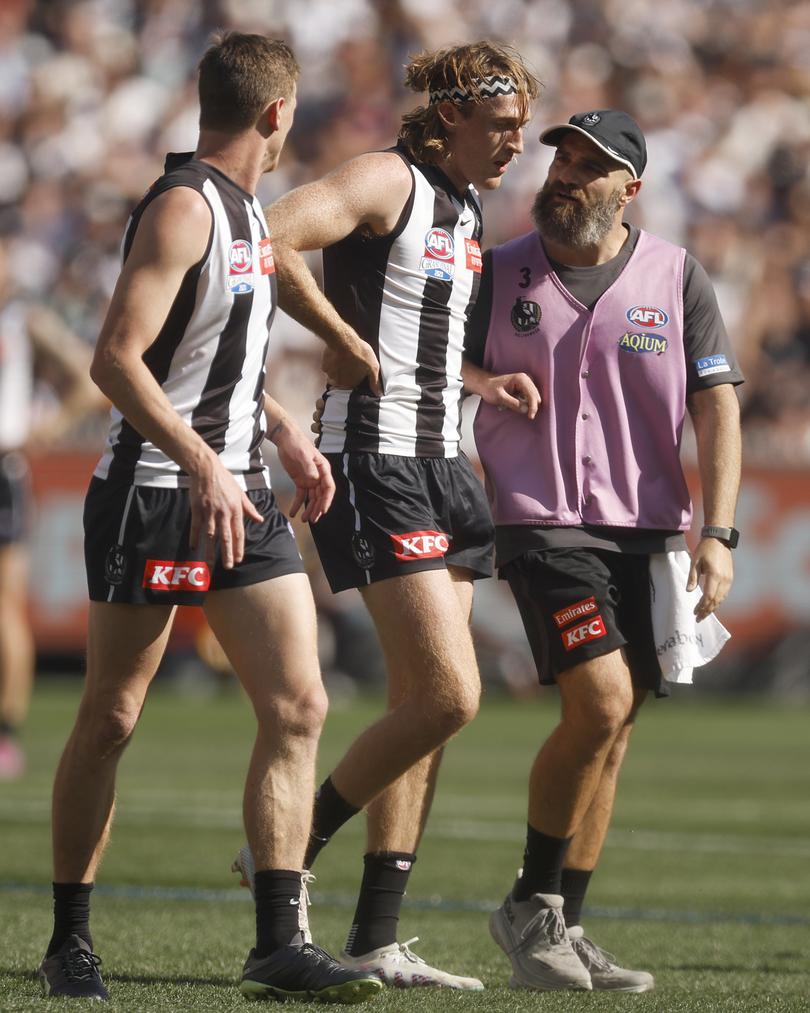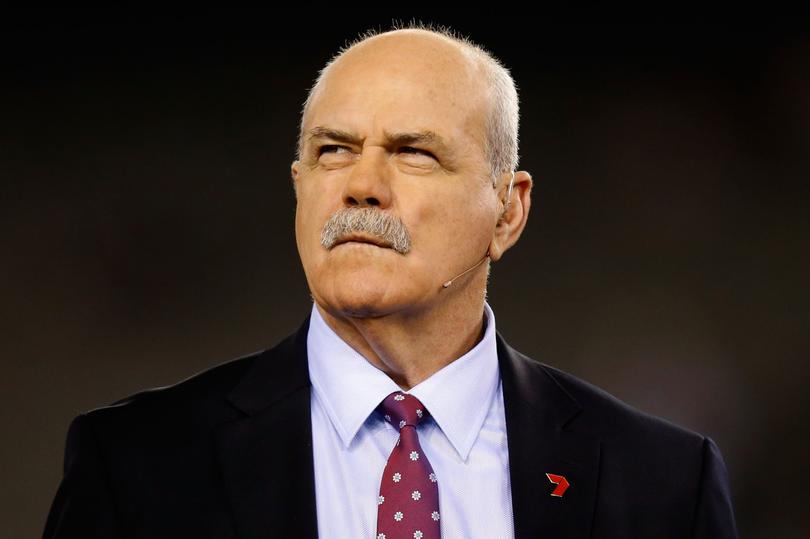AFL legend Leigh Matthews says removing the interchange bench would better protect players like Angus Brayshaw
AFL legend Leigh Matthews has made a bold call to arrest the epidemic of players suffering career-ending brain injuries. He says rules changes are only a band-aid solution and a more drastic approach is needed.
With the start of the 2024 AFL season only ten days away, the spotlight this week has again shone on the concussion-related issues that confront our sport.
The news that Melbourne Premiership player Angus Brayshaw is calling time on his career at just 28 because of repeated concussions is the latest reminder that the AFL is not having much success in making a dangerous game much safer.
While Brayshaw is the latest high-profile victim of one too many concussions, he is a highly paid professional under expert medical care and advice.
Sign up to The Nightly's newsletters.
Get the first look at the digital newspaper, curated daily stories and breaking headlines delivered to your inbox.
By continuing you agree to our Terms and Privacy Policy.What concerns me just as much are the number of players in the suburbs who play footy for fun who likely have similar issues that remain undiagnosed and untreated.
As a role model for all other levels, the AFL must continue the search for a better way.
This is a question that must be keeping new AFL CEO Andrew Dillon and his team up at night.
Stricter rules and regulations can only go so far.
Already intentional high contact has been largely officiated out of the game, careless high contact will mostly result in a suspension. Surely, we can never penalise accidental high contact.
For all the tightening of the rules to prevent high contact, in my opinion the modern game is more dangerous than the fabled more violent days of generations past.

Whilst the AFL has introduced rule changes, concussion protocols and other initiatives to manage the all too prevalent issue of head knocks there is rarely a game played at the elite AFL level where a player does not go to ground after suffering a high hit. Most are completely accidental, and most do not lead to a diagnosed concussion but any knock to the head cannot be good.
Much of the problem is player-driven.
Modern players display an aggressive high-speed attack on the contest which I find admirable but also often oh so dangerous. The courage displayed is quite reckless.
Running back with the flight was once a Jonathon Brown specialty. Now it is quite normal.
One reason for this reckless courage is a performance pressure that compels them to always put their body on the line, but I suspect also because the stricter rules “should” protect them from all but accidental contact. Too bad if a player with the same mindset is coming the opposite way which so often happens.
The 2023 AFL grand final was a frenetic fast-paced game that was thrilling to watch, but a completely accidental head knock forced Collingwood player Nathan Murphy from the ground with concussion and he missed the rest of the game. This is not a rare event but quite normal at the games top level.
So, to me the difficult task of reducing the severity of accidental head knocks and the concussion ramifications must be a priority in the AFL thinking.
Frankly we seem to be going around in circles.

For all of the recent initiatives introduced over recent years to make the game safer, the conflict has been that the conditioning process is spitting out players who are bigger, stronger, run faster for longer and more powerful than their predecessors.
When we add the extensive use of the interchange bench which became a coaching tactic from 2007-09 as rotations exploded from about 30 a game to well more than 100.
Players are now attuned to going flat out, have a few minutes rest, go back on and go flat out again.
The concept of a player pacing themselves to play all four 30-minute quarters has drifted into football oblivion.
If we really want to make the game safer to play maybe more fatigue is part of the answer.
No on-field rule changes required, just massively reduce or eliminating interchange should be seriously considered as part of the search for that better way.
This should lead to greater player fatigue, probably a lower overall tempo but less high-speed collisions and less high contact concussions.
For all levels of football that equation seems like a reasonable trade-off to me.

We have just seen the staging of the NFL Super Bowl and while a great gladiatorial spectacle there is no such thing as community gridiron in the US, hopefully AFL footy remains a popular participation sport for both males and females.
As we’ve seen last week with Brayshaw, there are increasing numbers of players retiring, many with long-term symptoms such as former West Coast player Dan Venables and Western Bulldogs premiership hero Liam Picken. Paddy McCartin of the Sydney Swans is another recent retiree because of concussion.
The reality that some former players later in life may develop the devastating chronic traumatic encephalopathy (CTE) affliction, leads to profound implications for the league’s responsibility in caring for its athletes during and beyond their playing careers, not only in a moral sense but legal cases instigated by past players seeking compensation for post-career problems are pending.
There are big dollars on the line.
The whole issue is a very dark cloud overhanging the AFL world.
Already concerned parents must be thinking hard about allowing their children to participate in a sport perceived as high-risk for head injuries.
It was interesting to hear Angus Brayshaw’s comments during his retirement announcement: “Concussion is a massive issue facing our game. I hope from this, a terrible result for me personally, can come some positive outcomes for the future of player safety”.
As Bob Dylan wrote, “the times they are a changing” and players, families of players, and fans alike will be watching to assess how the AFL grapples with this concussion conundrum.
